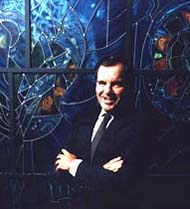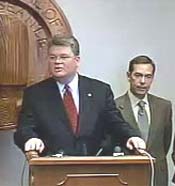
|
|
|
|
Disobedience and the Marriage Movement Minor Details |
|
Just about the time that the religious and political right-wing thought they had set the terms and images around the gay marriage debate, thought they had won, believed they could be on a fast track to a federal and a slew of state constitutional amendments, and even had the cowardly approval from the apparent Democratic presidential candidate, people who oppose the right did what they could to say "No." "The President" publicly supported the amendment, using this growing grass-roots "No" as his excuse, apparently to the surprise of no one but the gay Log Cabin Republicans. Starting with San Francisco Mayor Gavin Newsom on February 12, who ordered the city clerk to issue marriage licenses, the disorderly conduct began. It wasn't as if there was violence, certainly nothing like the violence perpetuated on LGBT people every week in this county. But it was against what the dominant order considered orderly. So it was, by the dominant standards, dis-orderly. Governor Arnold apparently panicked, calling for the gay marriages to be quashed before the protesting turned into "violent rioting." Openly gay Democratic Representative Barney Frank scolded the disobedient ones for messing up his enlightened, insider approach to the issue. Other "supporters," counseling patience - just how many more centuries should LGBT people wait? -- said it was a more effective strategy to use a political process over which marriage amendments loomed. But the defiant movement provided a popular excitement to this issue in the same way that Howard Dean's attempt at the Democratic presidential nomination excited people who otherwise found the mainstream of the Democratic Party staid and dull. There was some belief that LGBT people might actually be heard, might actually be a part of what it is to be an American. They were demonstrating that Americans get tired of discrimination and inequality and eventually do something about it.
Other cities, such as San Jose, California began to consider participation. Even the Baylor Lariat, the student newspaper of the world's largest Southern Baptist University, recognized the issue of legal equality involved and endorsed gay marriage. An "outraged" Baylor President immediately clamped down with the official, establishment line on students who had learned their lessons about legal equality. In spite of their stiff-upper-lip scowls and scorn, the anti-gay marriage people have been thrown off. In the light of last summer's Supreme Court decision legalizing same-sex sex, they've found themselves fighting for a legal position which allows uncommitted, even promiscuous, sex but not sex between two committed partners. They've found themselves caught in statements that make no historical sense when traditional marriages among the heroes of their Biblical documents were most often polygamy. They've found themselves arguing that marriage is a "sacred" institution while saying that the secular State should therefore be involved in its "sanctity." Of course, they're fighting the disobedience by appealing to those who they'll label "activist judges" if they don't side with the right wing agenda. The judicial responses have been legally cautious and measured. The more rabid followers have responded with the threats of violence Governor Arnold tried to blame on people who just wanted legal marriage. San Francisco's mayor is now under 24-hour police protection. In many states, anti-gay marriage amendments were proposed. In a few thus far -- Maine, Indiana and Wyoming -- community activists were able to see their defeat. And a March Washington Post-ABC News poll shows 51% of the respondents supported same-sex civil unions with all the legal rights of marriage, up 6 points since the disobedience began. Typically, the powers that be will come back and clamp down. They'll threaten, punish and scare. They'll attempt to make it seem as if the cause is hopeless. But civil disobedience changes the atmosphere. Civil disobedience re-sets the agenda. The forces of establishment prejudice, fear, and discrimination are now reacting to the new agenda. Gandhi and King knew this was so. And in their exciting tradition, disobeying laws that our conscience finds repulsive and unfair, the rising up of people to protest and fight for their rights, is what is going to change things in the long run. Will it continue, or will we rely again on the insiders who caution us to hide our feelings again? I wouldn't have chosen marriage as the most crucial issue we face. I'd rather have fought for the addition of sexual orientation to every state's equal protections laws - protecting our jobs, public accommodations, housing, and legal status. But 4,037 LGBT couples from 46 states were married in the civil disobedience in San Francisco alone. So if this is the issue that grabs the attention of our movement, including those closeted couples who have been living comfortably as committed partners for years, and gets them to stand up and say they are here, I'm for it.  Robert N. Minor, Ph.D., is Professor of Religious Studies at the University of Kansas. His Gay & Healthy in a Sick Society (HumanityWorks, 2003), was named one of the "Best Gay Books of 2003" and hisScared Straight (HumanityWorks!, 2001) was a finalist for the Lambda Literary and Independent Publisher Book Awards. He may be reached at www.fairnessproject.org .
Robert N. Minor, Ph.D., is Professor of Religious Studies at the University of Kansas. His Gay & Healthy in a Sick Society (HumanityWorks, 2003), was named one of the "Best Gay Books of 2003" and hisScared Straight (HumanityWorks!, 2001) was a finalist for the Lambda Literary and Independent Publisher Book Awards. He may be reached at www.fairnessproject.org .
|
|
 Mayor Richard Daley of Chicago is one of a growing number of public officials that are using their power to bring equality to same-sex couples seeking to marry
Mayor Richard Daley of Chicago is one of a growing number of public officials that are using their power to bring equality to same-sex couples seeking to marry  Seattle Mayor Greg Nickles announces his city's intention to extend marriage benefits to gay employees married elsewhere
Seattle Mayor Greg Nickles announces his city's intention to extend marriage benefits to gay employees married elsewhere